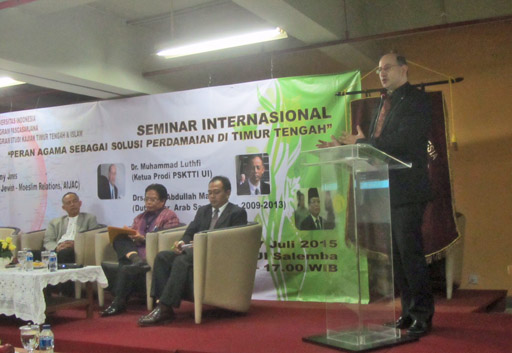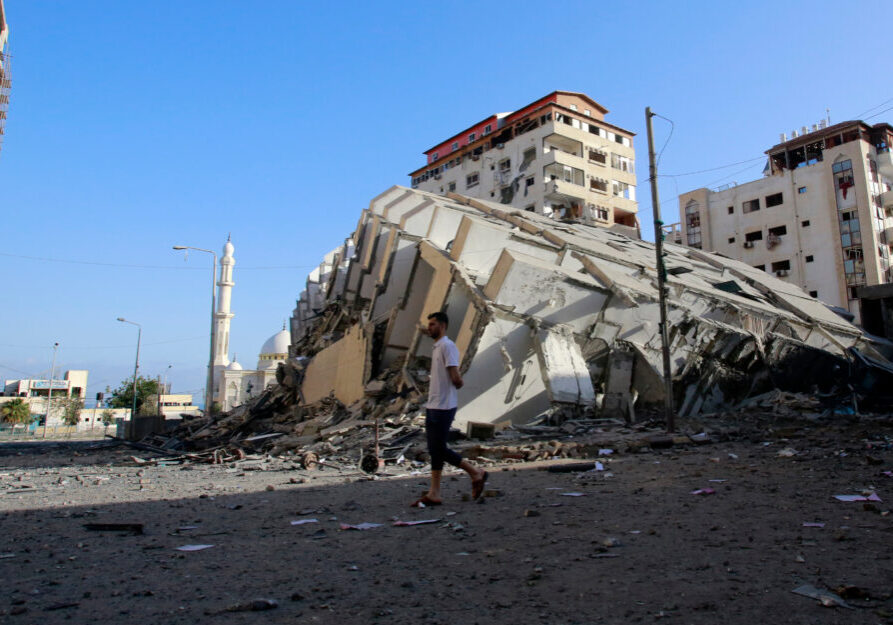Australia/Israel Review
The Last Word: The beginning of a new era?
Aug 27, 2015 | Jeremy Jones

Jeremy Jones
There is a wonderful Indonesian celebration known as Hallal bi Hallal.
Shortly after the end of Ramadan, Indonesian Muslims, and their guests, gather to strengthen interpersonal bonds and make peace with each other, just as during Ramadan they had been concentrating on their relationship to, and bonds with, G-d.
Walking into a beautiful ballroom in central Jakarta for this year’s event hosted by the Indonesian Association for Religions and Culture, I was greeted warmly and thanked for bringing Jewish participation to a celebration of friendship attended by political and religious leaders, diplomats and representatives of many segments of multicultural, multi-religious Indonesia.
I had Muslim and Christian friends introduce me to their friends, and I was almost overwhelmed by the interest of those present to meet with, and talk to, a Jewish person – the first one with whom many had ever spoken.
This was the first of a series of engagements for me on a five city speaking tour of Java, chock-full of official events and opportunities to have serious, honest and open discussions with scholars and other opinion leaders.
My program had been put together by academic, inter-religious activist and policy advocate Nur Munir, assisted by other members of the group of Indonesian Muslims who participated in the January 2015 visit to Israel and the Palestinian Authority in honour of the memory of former Indonesian President Abdurrahman Wahid, known affectionately as Gus Dur. It included a moving visit to the grave-site of that inspirational religious and political leader and my being an official guest at the Muktamar (summit) of Nahdlatul Ulama, the world’s largest Muslim organisation.
At the summit, attended by nearly 4,000 voting delegates and twice that number of observers, I again had numerous opportunities to discuss Judaism, contemporary Jewry, the history and politics of Israel and much more. At all times, there appeared to be both excitement and enthusiasm to host, meet and talk with a Jewish person.
In university staff rooms I had a series of discussions about ways of removing misconceptions about Jews – and about Indonesians. In seminars and public events, audiences listened respectfully and attentively and then peppered me with questions.
Whether discussing attitudes to minorities at a university in Jakarta or religious debates on dialogue with others in front of an enormous crowd at a pesantran in central Java, there were questions on everything ranging from the structure and nature of Jewish prayer to the relationship of western foreign policy to the development of ISIS.
In seminars at the Shariah law faculty in a campus in Semarang and the Middle East Studies department at Indonesia’s most prestigious university, there were questions on human rights, the relationship of the Torah to the Koran, views on heaven and hell and the range of realistic scenarios for Israel, Palestinians and the region.
At an interfaith round-table in Yogyakarta, I fielded more than 30 questions from a Muslim who believed Indonesian law should be subservient to Shariah, a Christian who had been unaware Jews did not see Jesus as the Messiah, an Ahmadiya who argued that the Torah instructed Jews to accept Jesus and Muhammad as prophets, a student who saw Israel at the heart of an anti-Islamic conspiracy, and a range of others who seemed to relish the opportunity to challenge me theologically and politically. It was always respectful, even friendly.
In the Central Mosque in Jombang, and subsequently walking through the streets of that beautiful town, a seemingly endless stream of well-wishers called out “Shalom” or began conversations on Judaism, before inviting me to spend more time in their country.
Each day I was there, I was conscious of how much there is to do in helping Indonesians come to know Jews and Judaism, and how much commitment there is, from serious and authoritative figures, for Indonesia to play an important, influential role in global affairs.
I was also conscious that the invitations I received demonstrated a genuine interest in building understanding and trust – which demands, and will receive, the time and effort to bring that goal to fruition.
This article is featured in this month’s Australia/Israel Review, which can be downloaded as a free App: see here for more details.






